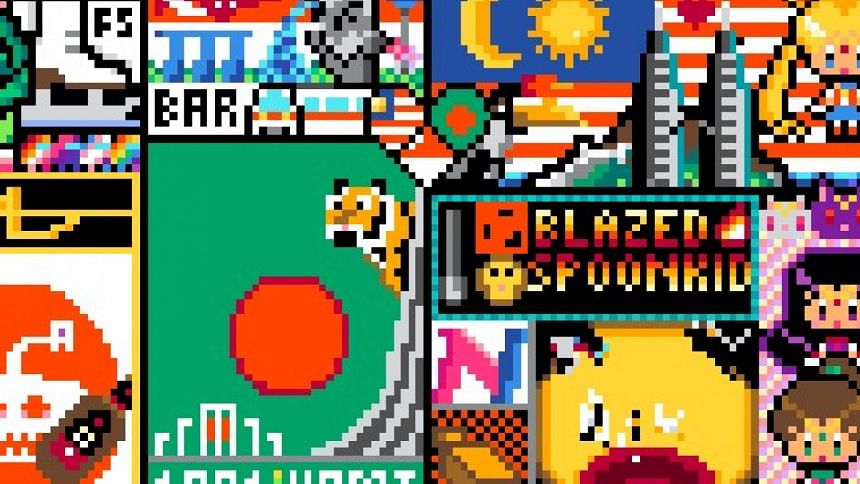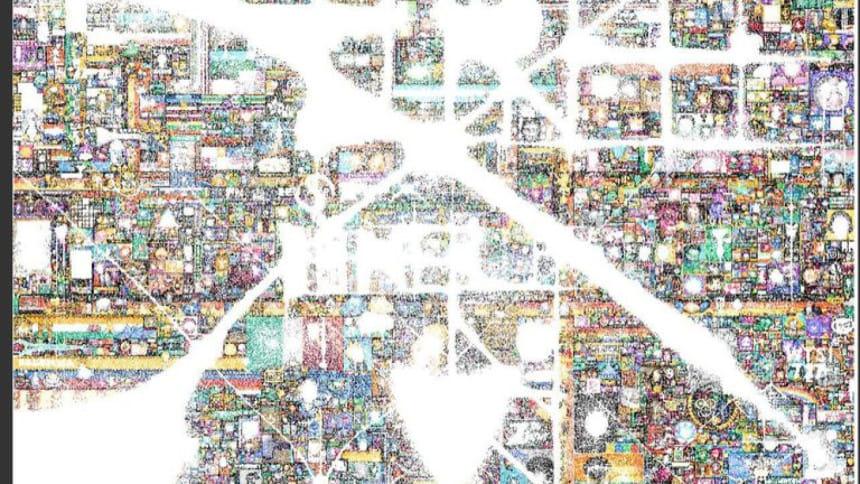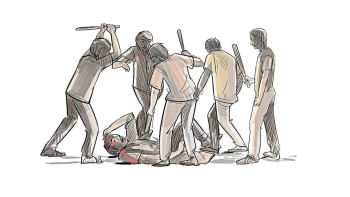Internet’s greatest art war, and the fight to keep Bangladesh in it

You probably missed it, but the internet just saw a melancholic end to one of its largest collaborative art projects. Reddit's r/place, a subreddit that is essentially a massive open digital canvas, came to an end on April 5, after returning for the first time since its debut in 2017.
r/place started as an April fool's experiment in 2017. It was termed a 'social experiment' that aimed to showcase the best and the worst of the internet. This year, it truly proved its purpose as over five million people on Reddit banded together for four days, creating, destroying, rebuilding and finally giving shape to a beautiful and chaotic tapestry of collective human emotions and experiences, expressed through pixels.
For four days, art was created, battles, if not full-scale wars, took place over pixel space, alliances were formed, vandalisms ran rampant and human stories were crafted patiently with nothing but pixels. Before the void came for them all and the canvas turned blank, the subreddit r/place represented the very nature of humankind in all its beauty and chaos.
A tiny shade of red and green
I stumbled upon this digital tapestry on its final day, April 5, just before it was about to disappear. It was beautiful. A chaotic and beautiful graffiti made of pixels that had everything from Renaissance-style art to anti-war anarchic pieces. Amused and interested, I was ready to be awed by its scale and beauty, only to get my eyes stuck on a tiny corner of the canvas where a red and green shade was peeking from.
I zoomed in. It was a small Bangladeshi flag, complete with a royal Bengal tiger, a Shaheed Minar and a pixelated national mausoleum. 1971 and 'HOMI' were etched onto the flag, with Bangladesh written on it in Bengali.

A simple thing. But I was reading up on r/place a little, and I had some idea of how painstakingly difficult it was to create and maintain a pixel space. Here's how it goes: on the r/place canvas, each user can only post a single coloured pixel, every five minutes. Meaning, to create a detailed art piece, it would take a large group of people to come together and keep at it for hours. That's the easy part.
The hardest part is to maintain that pixel space that they created. When over five million people come together on a single 1000x1000 canvas, it exposes human nature. Users invade your space, vandalise your art and everyone wants the largest space for themselves. They will overwrite your pixel and you have to stay on guard to quickly restore your pixel to keep your art intact. You keep doing this until the project ends and whatever stands when the dust blows off, is your final piece. In the end, to survive, you either fight it out alone or form alliances with other users.
And so, I got curious. Did someone–or some group–really take all the trouble to make a Bangladeshi flag stand out in one of the internet's largest art projects? I had to find out.
The r/bangladesh community
A quick cursory search on Facebook sniffed out two profiles that had posted about creating the Bangladesh art in r/place. I contacted them, and before I knew it, I found myself on a Discord server, speaking directly to a community of over 300 complete strangers who all came together and contributed in creating the Bangladesh piece in r/place—all eager to share their collective story of passion, patriotism and commitment. This is that story.
It started randomly, they told me. Someone started filling out pixels in the colours of the Bangladesh flag and there was virtually no coordination. The first iteration was small and simple. But more importantly, pixels were being invaded by other groups or users faster than they could be restored. The very first flag was ultimately completely destroyed by an 'Among Us' community.

So a Discord server was opened up where everyone could come together from the r/bangaldesh subreddit and beyond, and then coordinate. It started with four to five people. By the time r/place ended, it was a community of nearly 400.
They all took turns in creating a new Bangladesh flag with all the elements inside it, one pixel at a time. They were constantly on guard to fend off vandalisers and invaders, patiently and quickly restoring lost pixels. When they saw opportunities, they formed alliances with other communities.
Diplomacy is the key
"Everyone wants to own their space and to expand it. That's how it is. Just like they do in real-life scenarios, we had to take cautious, diplomatic decisions if we all wanted to protect our pixel spaces and keep expanding them," said one of the members of the community.
Diplomatic channels or 'embassies' were created on Discord to establish diplomatic relationships with communities from other countries. And these diplomatic 'missions' paid off.
Communities from Singapore and Malaysia, among others, helped Bangladesh protect its space from other invaders until the end of the project. In return, Bangladesh did the same. Like an unofficial tripartite treaty, for three days, the three countries formed a joint alliance on Reddit to help each other thrive. Near the end, they also formed a joint heart-shaped art to mark their alliance—a wholesome affair altogether.

A similar alliance was also formed with HOMI, a small North-America based gaming community. HOMI was generous in giving up its own space to Bangladesh and even helped the Bangladesh community pull off the final design of the artwork. In return, they were honoured with their name etched onto the final artwork.
The best of the internet, and the worst of it
Over the course of four days, the r/place canvas went through significant changes and reshuffles. The chaotic beautiful tapestry changed its form over and over again before settling on a final form, right before the big erasure. Countless arts were created and even more were vandalised, statements and counter statements were made, and unprecedented instances of international unity and mindless destructions were showcased.
R/place, in all its entirety, stood to showcase the best and the worst of the internet sub-culture. On one hand, it showcased the strength of alliance and friendship between communities. On another, it proved that some just want to watch the world burn. It also showed that art can be created in any form and shape (pixels, too).
United by an emotion
But for the Bangladeshi community who upheld the country's flag on the internet's most talked-about canvas, it meant something more than all that. I asked them why it was so important that they spend sleepless nights over a pixelated Bangladesh flag on Reddit?
"We wanted to do something for the country. We wanted to showcase Bangladesh to the world. And we wanted to feel patriotic and proud," replied one of them.
"When the canvas was turning blank, we all came online on the Discord server and we played our national anthem. I've heard the national anthem countless times but never before has it felt so personal. I had an ecstatic sense of accomplishment. I felt goosebumps. I'm sure we all did."

"This was the first time we realised the true meaning of the phrase–earning independence is easy, keeping it was the tough part."
When I was speaking to a few members who represented the entire community before writing this article, they insisted that I do not use their names in the quotes. They did not want any limelight. For this was not an achievement by any single person, but a "collective win", they told me. Out of respect, I kept it that way.
None of the members I spoke to would be older than your average college or university-going age. They are what you'd ideally call the 'hopeless Gen-Zs'. But an hour-long conversation with them had me wondering—who'd you rather back when it comes to exploring patriotic sentiments? Those who insist on feeding you patriotism in the form of radical nationalism? Or these 'Gen-Zs' who'd rather lose their sleep over a hopeful purpose? A purpose in the form of a statement that says Bangladesh matters. That Bangladesh will be seen and heard.
Nearly 400 people, all from different parts of the country, some from abroad, united by a single emotion of patriotism, came together over the course of four days to create that statement on the world's most chaotic canvas. And I, for one, will not be giving up on them.

 For all latest news, follow The Daily Star's Google News channel.
For all latest news, follow The Daily Star's Google News channel. 



Comments